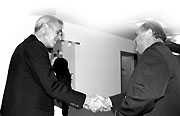
WCC general secretary welcomes new WTO leader
New director-general of the WTO (Mike Moore) greeted WCC general secretary (Konrad Raiser) when he met with WCC programme staff involved in issues of globalization. There is no an agreement to hold furhter discussions.
|
The Justice, Peace, Creation team of the WCC organized a small meeting in September 1999 in Geneva to analyze and evaluate preparations for the Third Ministerial Round of the World Trade Organization (WTO) in Seattle. The group included experts and representatives of networks working on environmental issues, agriculture, international trade and finance, and the funds, programmes and agencies of the UN system.
A number of already existing agreements are up for review by the WTO. The list includes agreements on agriculture, textiles, services, and trade-related intellectual property rights. Highly industrialized countries want to add to this list and introduce new issues to the WTO agenda. Many of the developing countries, however, are opposed to these efforts.
Developing countries first want to overcome the existing imbalances in agreements, rules of procedure and processes that work to their disadvantage. Social movements and civil society groups are calling for more transparency and accountability on the part of the WTO. They want to re-define WTO’s role in the UN system.
Many of the WCC member churches, church-related development agencies and ecumenical groups are preparing themselves for the Third WTO Ministerial Round. Some of them have started to contact the ministries of trade and finance of their respective governments. Based on the insights and criteria presented in the Background Document on the WTO, the group that met in Geneva in September wanted to contribute to preparations by ecumenical partners and share the following concrete proposals with them:
- Oppositions to any efforts to expand the power of the WTO through a deepening and extension of trade liberalization is a high priority. The new negotiations should accept the primacy of the developing countries’ concerns and their proposals for "review, repair and reform" of the old agreements. Their concerns must be satisfied, without any cross-sectoral bargaining (early harvest). This especially refers to improvements to the Agreements on Agriculture, Trade-Related Intellectual Property Rights (TRIPS), Services (GATS) and Textiles that were proposed and tabled by developing countries.
- A moratorium is required on new issues or regarding the further development of international harmonization of standards, policies or laws. As in the case of social standards, where the discussion was referred to the International Labour Office (ILO) as the appropriate international organization, the development of trade-related environmental standards should not be the task of the WTO. The existing Multilateral Environmental Agreements ought not be challenged, new MEAs ought to be left to the other mandated UN organizations, and existing national standards should be mutually recognized.
- Further work on the Competition Law needs to be initiated in order to study:
- how to fight restrictive business practices in international trade,
- how to arrive at a code of conduct for transnational corporations and
- how to assist developing countries to set up their own national competition laws.
- The new negotiations should primarily aim to reform the WTO in order to
- make it more transparent,
- make the negotiations more accountable, by providing binding procedures for national delegations and for the WTO Committees to have consultation processes with civil society, parliaments and the private sector.
- The Dispute Settlement Processes need to leave ample room for also considering non-trade-related concerns brought forward by other parties. It would be helpful to explore and develop possibilities for appeal outside the WTO, but within the UN System.
- The WTO needs to open itself up to other UN organizations and come to binding contracts of coordination. The UN Sub-Commission on Human Rights, for example, called for appropriate mechanisms regarding Human Rights.
- As part of the preparatory process, churches might hold public hearings, church discussions, prayer vigils, public and peaceful protest action, and inform mass media about their concerns regarding the WTO Ministerial Round.
A background document on the WTO and the preparatory process for the WTO Ministerial Round (30 November -- 3 December, 1999) in Seattle, is available from the JPC team, WCC (our current address) and on our web-site at
http://www.wcc-coe.org/wcc/what/jpc/wto-bgd.html.
|


